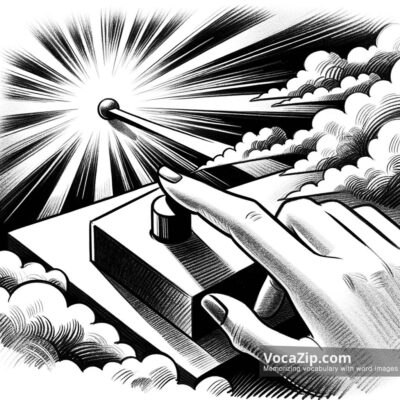trigger meaning
trigger :
cause, catalyst
noun
▪ The trigger of the gun was pulled.
▪ The cause of the gun was pulled.
▪ The loud noise acted as a trigger for his panic.
▪ The loud noise caused his panic.
paraphrasing
▪ catalyst – cause
▪ stimulus – cause
▪ spark – cause
▪ impetus – cause

trigger :
cause, activate
verb
▪ She triggered the alarm when she saw the fire.
▪ She activated the alarm when she saw the fire.
▪ The news triggered a strong reaction from the audience.
▪ The news caused a strong reaction from the audience.
paraphrasing
▪ activate – cause
▪ initiate – start
▪ provoke – cause
▪ spark – cause
Pronunciation
trigger [ˈtrɪɡər]
The stress is on the first syllable 'trig' and sounds like 'TRI-gər'.
Common phrases and grammar about trigger
trigger - Common meaning
noun
cause, catalyst
verb
cause, activate
Part of Speech Changes for "trigger"
▪ triggering (adjective) – causing something to happen
▪ triggered (verb) – caused to happen
Common Expressions with "trigger"
▪ trigger a reaction – cause a reaction
▪ trigger an alarm – activate an alarm
▪ trigger a response – cause a response
▪ trigger an event – cause an event
Important examples of trigger in TOEIC
Vocabulary examples from the TOEIC test
In TOEIC vocabulary questions, trigger as a noun often refers to a cause or catalyst, while as a verb it means to cause something to happen.
Example of a confusing word: tripper (someone who trips or travels)
Grammar examples from the TOEIC test
As a verb, trigger is often used with direct objects to indicate what is being caused.
trigger
Idioms and fixed expressions in TOEIC
pull the trigger
'activate the mechanism', used when talking about guns or machines.
set off a trigger
means 'activate a cause', used metaphorically for initiating events.
Differences between similar words and trigger
trigger
,
activate
differences
Trigger is used to cause something to happen, often suddenly, while activate is to make something active or start it functioning.
trigger
,
provoke
differences
Trigger is often used for initiating actions or reactions, while provoke usually refers to causing emotions or responses, often negative.
Words with the same origin as trigger
The origin of trigger
trigger comes from the Old French 'trigrer', meaning 'to activate or set in motion'.
Word structure
It has no clear prefix, root, or suffix as it originates from Old French and has evolved into modern usage.
Words with the same origin
The root of trigger is unclear or difficult to confirm.
Please select an image in the quiz
Previous post and next post


susceptible
1941
easily affected, open to influence
adjective ┃
Views 2






